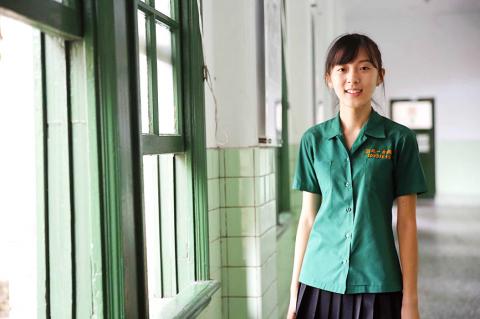The term “dinosaur judges” stems from a misperception of how the law operates, said Chang Pei-chieh (張沛婕), a Taipei First Girls’ High School student who has been approved to study in National Taiwan University’s (NTU) College of Law.
Chang made the comments yesterday in a press statement announcing the results of the Advanced Subject Test.
Chang said she thought she had done well in the initial General Scholastic Abilities Test, but signed up for the Advanced Subject Test when her scores did not match her expectations.

Photo: CNA
The Advanced Subject Test is a means to increase university admissions, allowing departments to decide admittance thresholds.
Students select the universities they prefer to attend in order of preference and register them online. They are placed according to their exam scores.
Chang said she had always liked logical thinking, which is an important factor when studying law.
Learning law would enable her to protect her own rights and those of her friends and family, she said.
Chang said she was fond of the US TV show Suits, but it had not influenced her decision to study law at NTU.
Chang said she was sympathetic toward the judiciary, which in recent years has been criticized for its “dinosaur judges.”
The public’s perception of the law might be rather superficial, Chang said, adding that she suspects that while judges might consider a suspect’s actions to be morally unacceptable, the judges are bound by the law and must render judgements accordingly.
This is probably the main reason rulings sometimes fall far from what people expect, Chang said.
The public should invest time to understand the law more precisely, she said.
Chang said her personality played a factor in her decision to choose NTU and she strives to understand reasons in a seemingly unreasonable situation, where other people might simply let it be.
Chang said she was leaning toward becoming a lawyer, rather than devoting herself to the judiciary by becoming a judge.
By the time she is 70, one-quarter of the population would be elderly and she might not have pension benefits, she added.

RESOLUTIONS DEBATE: Taiwan’s allies said that UN and WHA resolutions cited by China and other nations ‘do not determine Taiwan’s participation in WHO activities’ A proposal to invite Taiwan to this year’s World Health Assembly (WHA) was rejected on Monday, resulting in Taipei’s absence from the annual meeting for a ninth consecutive year, although partners spoke up for Taiwan’s participation at the first day of the meeting. The first agenda item after the opening was a “two-on-two debate” on a proposal to invite Taiwan to participate at the WHA as an observer. Similar to previous years, two countries made statements in favor of the proposal, while two others expressed their opposition. Philippine Secretary of Health Teodoro Herbosa, president of the 78th WHA, accepted the WHA General Committee’s

Palauan President Surangel Whipps Jr arrived in Taiwan last night to kick off his first visit to the country since beginning his second term earlier this year. After arriving at Taoyuan International Airport at around 6:30 pm, Whipps and his delegation were welcomed by Minister of Foreign Affairs Lin Chia-lung (林佳龍). Speaking to gathered media, the Palauan leader said he was excited and honored to be back in Taiwan on his first state visit to Taiwan since he was sworn in this January. Among those traveling with Whipps is Minister of State Gustav N. Aitaro, Public Infrastructure

Premier Cho Jung-tai (卓榮泰) on Friday laid out the Cabinet’s updated policy agenda and recapped the government’s achievements ahead of the one-year anniversary of President William Lai’s (賴清德) inauguration. Cho said the government had made progress across a range of areas, including rebuilding Hualien, cracking down on fraud, improving pedestrian safety and promoting economic growth. “I hope the public will not have the impression that the Cabinet only asked the legislature to reconsider a bunch of legal amendments,” Cho said, calling the moves “necessary” to protect constitutional governance and the public’s interest. The Cabinet would work toward achieving its “1+7” plan, he said. The

Nvidia founder and CEO Jensen Huang (黃仁勳) hosted a dinner in Taipei last night with key Taiwanese suppliers to celebrate the successful mass production of the company’s new Blackwell AI systems. Speaking to the media earlier yesterday, Huang thanked Nvidia’s Taiwanese partners for their contributions to the company’s ecosystem, while also sharing his plans to meet with Taiwan Semiconductor Manufacturing Co (TSMC) founder Morris Chang (張忠謀). In response to rumors that Nvidia will launch a downgraded Hopper H20 chip for China in July, Huang dismissed the reports, saying, “That is not true.” He clarified that there